How a fluffy Romanian stray dog ends up in London and ...in a book
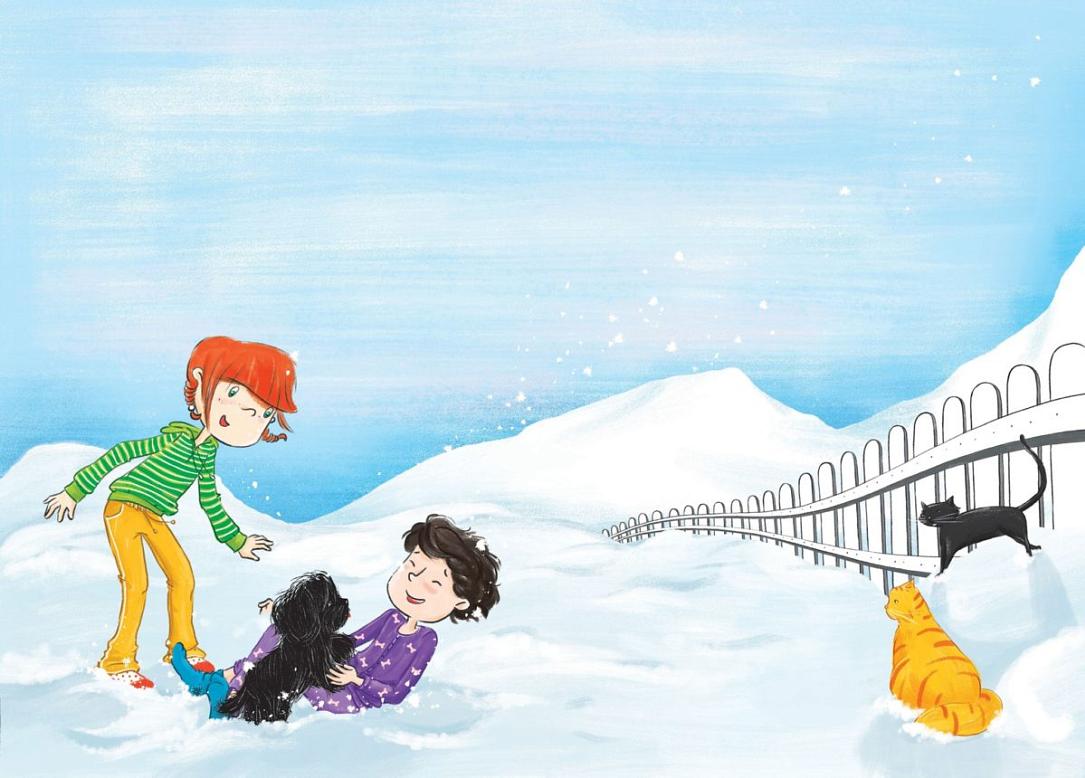


The Gaudeamus book fair in Bucharest is disheartening for people who have a very specific goal and very little time to achieve it. The place is big, fairly badly organized and it can take a while to find a book launch. Luckily, Arabella McIntyre-Brown, the person I am looking for, is wearing a large, pink hat which can be easily spotted in the crowd.
Arabella is a British writer and publisher, who launched a bilingual children’s book called “Floss the Lost Puppy” at the Gaudeamus fair end-November.
Arabella has been living in the last years in a remote village in the mountains of Transylvania.
We somehow manage to find two empty seats at an improvised fast food within the book fair. I grab a coffee, Arabella goes for a bottle of water, and we start chatting about the book, surrounded by a lot of kids.
“The dog’s story is true. I invented for the benefit of the story Thea, who’s the central character. She’s scared of dogs,” says Arabella.
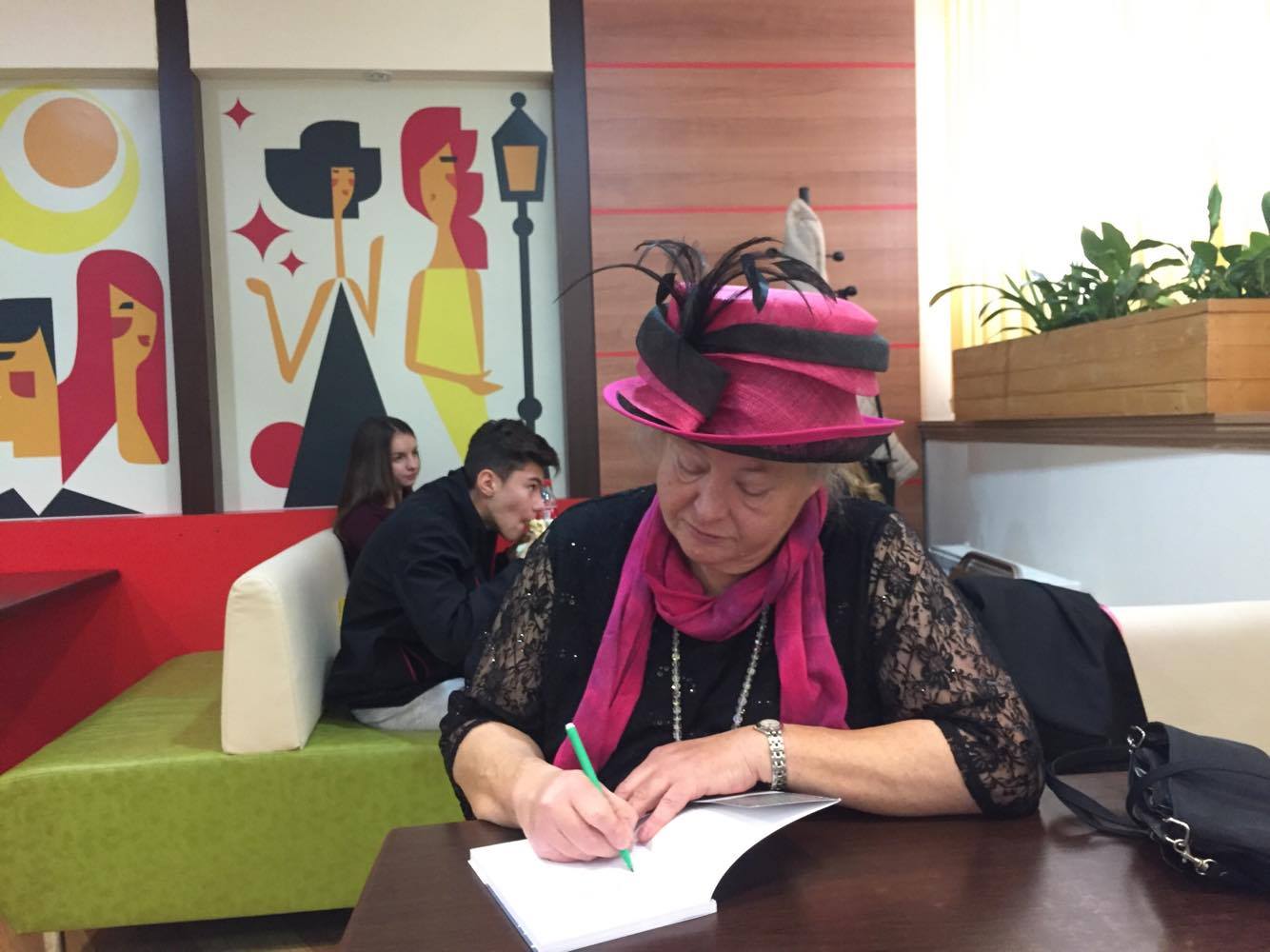 Arabella signing a book
Arabella signing a bookThe British writer moved from Liverpool to Măgura, in central Romania, in 2010, after the deaths of many important people in her family during a short period of time. She needed a quiet place, and she found it in Romania. In the last two years, Arabella published a book about her life in Măgura called “Din Liverpool în Carpati” (From Liverpool to Carpathians) and a children’s book, “Dragons over London”.
Her peaceful life in the mountain village, with her four cats and occasional guests, was disrupted by the appearance of a puppy in front of her house in the middle of winter. It was around Christmas in 2015. Arabella called the dog “Pita” (a regional word for bread in Romanian) and agreed to let him in for a while. However, she knew she couldn’t commit to take care of him because she travels a lot and is quite busy. Arabella started posting photos of Pita on her Facebook account, trying to find a home for him. After a short email exchange, her cousin in London, Vicki, decided she would take the dog. Several days later, everything was ready. Pita had a passport, had been taken to the vet and Arabella had even found a carrier to transport him to London.
“On the 1st of January, he was out playing with his friend Haiduc. They love each other, lots of snow. I went to call him in at 4 o’clock. There was no dog. He vanished. That was the end. I waited until the last minute to call Vicki and tell her. And we searched and searched. It was -18 degrees. Thick snow,” says Arabella.
Several weeks passed by, and she was certain that the dog would not survive. She feared the cold weather, and she feared even more people’s cruelty. Romania is not actually famous for its good treatment of animals.
***
The life of a stray dog in Romania is tough. It’s probably even tougher if you’re a stray dog in Romania’s capital;- at least this has been documented more.
Bucharest had about 60,000 stray dogs in September 2013, according to the municipality’s estimates. In the following 18 months, local authorities started a massive campaign to remove stray dogs from Bucharest’s streets. The results are uncertain, as the authorities shared two different sets of conflicting information, revealed an article by local Hotnews.ro in February last year.
In mid-January 2015, the Bucharest City Hall announced that it had captured over 51,200 stray dogs between September 2013 and January 2015. Some 23,000 of them were adopted and over 26,200 were killed through euthanasia, according to authorities.
A year later, representatives of the Bucharest City Hall said that local authorities captured 32,933 dogs between September 2013 and the end of 2015. Over 16,100 were given for adoption and 13,187 were euthanized. When confronted with their previous statements, city hall representatives said that the first data were wrong, they represented a “material mistake”.
Whether it was a mistake or not is another story. But at the very least, it shows local authorities’ huge negligence when it comes to animals. The “material mistake” was about not less than of 20,000 dogs.
Things are not great on a society level either.
The dog adoption culture is still underdeveloped in Romania, says Claudia Dumitru, who works for Eli Pet Transport, part of the Eli for Animals charity, which rescues stray and abused dogs from the streets of Romania. People prefer buying purebred dogs than adopting rescue dogs.
Stray dogs live on average 3-4 years, she explains. The only way to gradually decrease the number of stray dogs is sterilization.
“No matter how many dogs you’d capture from the streets, the result is only temporary. You can’t take them all. The number has to be reduced gradually,” Dumitru says.
***
“I live with my family in the mountains. My dad is called Doru Thimble but I don’t have a mum any more because she died. Our granny Dido lives with us. My big brother is Robert, and my little brother is Tudor. Our boy cat is Shilling and our girl cat is Farthing. Who is missing?
Oh, ME! My name is Thea Thimble and I’m ten years old. I have red hair and green eyes, but everyone else in the family dark.”
So begins the story of this family living in the Hay village, Haystack county, Transylvania.
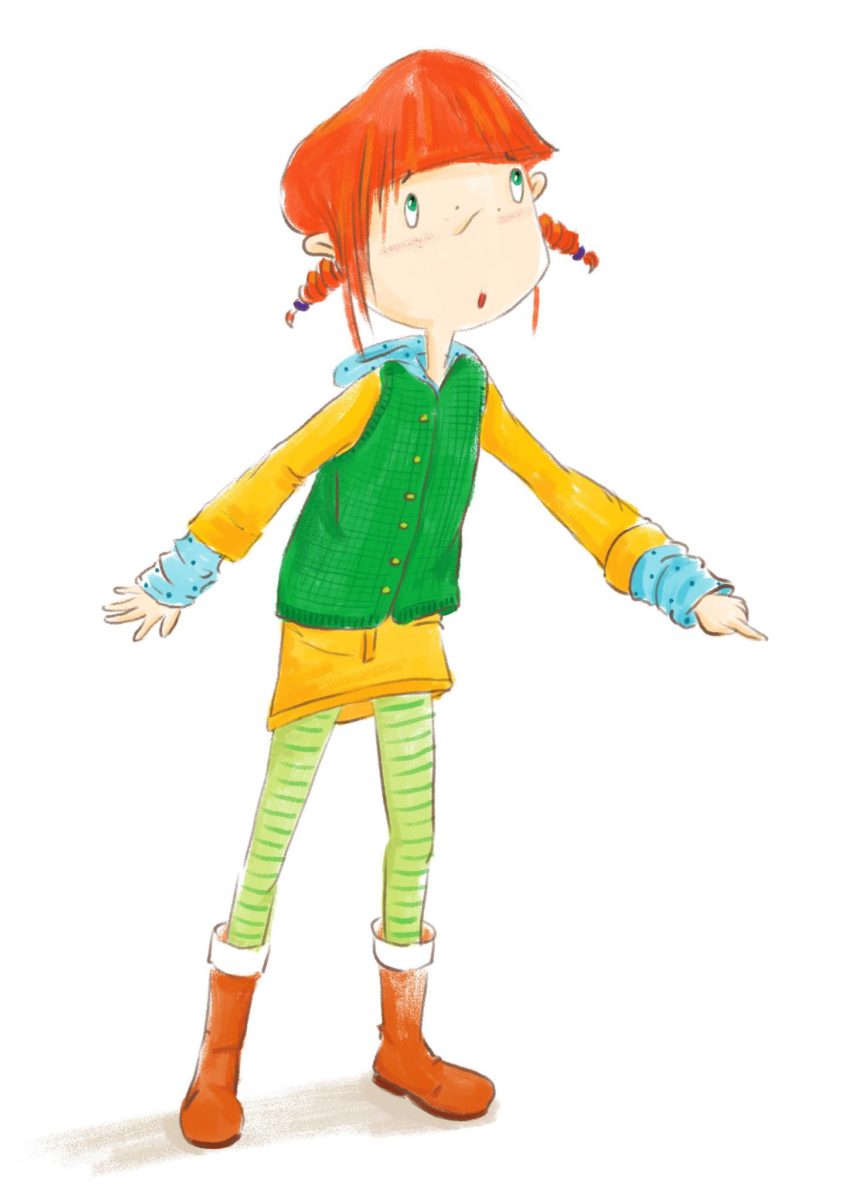 Thea, the main character in the book
Thea, the main character in the bookThea is the narrator and she is afraid of dogs because a dog once bit her. That creates a big conflict in her heart when a little dog shows up in front of their old, wooden house, in the middle of the winter. He seems cute, but she’s scared of dogs.
“The conflict in the book is not a fight or a battle,” explains Arabella at the Gaudeamus fair. “It’s in her head and her heart. Between her head and her heart. And she has to fight that battle to overcome her fear. And there’s another problem. Her little brother is allergic, sneezes whenever he touches the dog.”
The family decides to find a home for the little dog they call Floss. Their neighbour, a foreign man from Wales, who is a painter, helps them. His cousin Vicki, who lives in London, wants to take the dog. But a few days before departure, the dog disappears.
It’s the perfect film script, Arabella explains. “Happy, happy, happy, disaster, disaster, happy,” she says.
***
Victoria Gordon had had a knee surgery, so when she returned home that evening she took a painkiller and some wine. It was right before Christmas, in 2015. She opened her e-mail and saw a message from her cousin Arabella. “Have you read on Facebook about the dog?” No, I haven’t, send me an e-mail, Vicki replied.
“I saw a picture and I said: send him over. The next morning when I got over the pain killer and the wine I wasn’t so sure anymore,” Victoria recounts laughing two years later.
Vicki goes on: “He was supposed to come in January and he disappeared. It felt like forever. Arabella was so upset.”
With the risk of spoiling the story, I’ll say that the dog finally arrived in London, though later that planned.
His name is now Bertie. Victoria was going to call him Vlad, from Vlad the Impaler. But he didn’t look like a Vlad.
“I’ve got this very old neighbour. She said to me what’s his name? I don’t know yet. He has to be Bertie. Why? My name is Victoria. Queen Victoria’s husband is Albert and Bertie is the short name for Albert.”
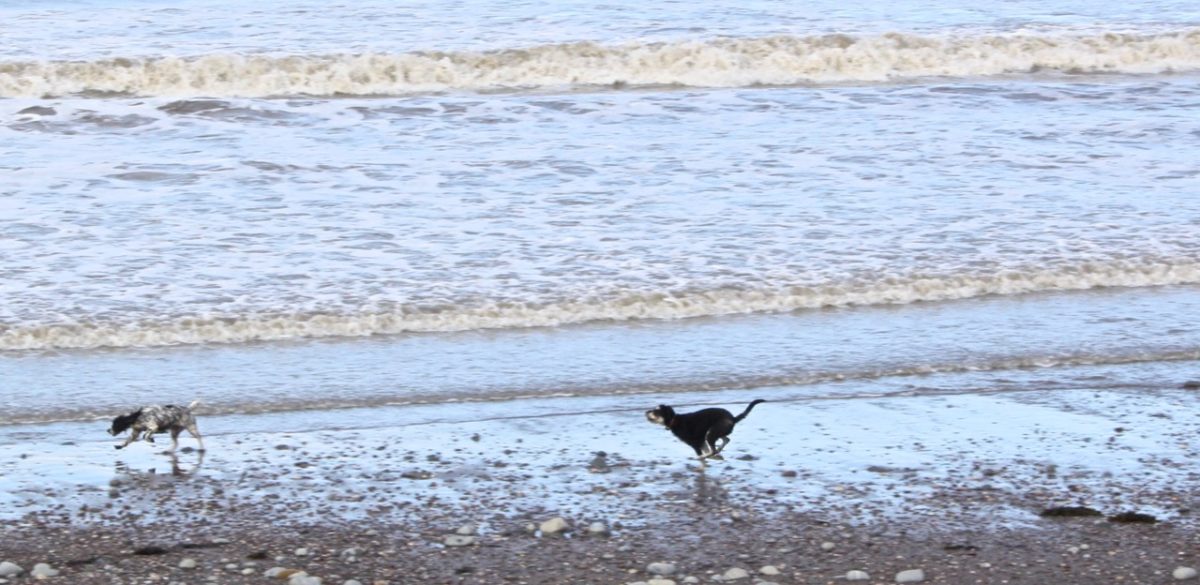 Happy real-life Floss - Pita (now called Bertie) on an English beach with his chum Button.
Happy real-life Floss - Pita (now called Bertie) on an English beach with his chum Button.The fluffy dog from Transylvania got a royal name. Even more important, he’s got an enormous group of friends in the park, Victoria says. He enjoys living in central London. There are a lot of squirrels and foxes for him to chase.
“Central London has an enormous amount of animals. Ridiculous,” says Victoria.
It has become very popular in the UK to adopt dogs from abroad.
“In the park where I walk in the morning with Bertie there is another dog from Romania, a dog from Spain, a dog from Cyprus. Most of the dogs in the park are rescue dogs,” Victoria says.
For her, adopting this dog has been life-changing.
“I had a very major operation on my knee. Having to walk him every day has helped my knee so much, and also made me happy,” Victoria says.
It’s also a chance to meet other people, have a chat. Children stop and ask if they can pet him.
“It’s so easy not to talk to anybody especially in London because it’s a big city. I could, if I wanted to, spend the whole day not talking to anybody,” Victoria says.
She has shown her acquaintances in the park the pictures that come with Arabella’s book. “Look, this is Bertie. It’s hilarious.”
I ask Victoria what she thinks the lesson of this story is, if there is any lesson at all.
Victoria thinks for a while, and then adds: “You should follow your heart and take a dog.”
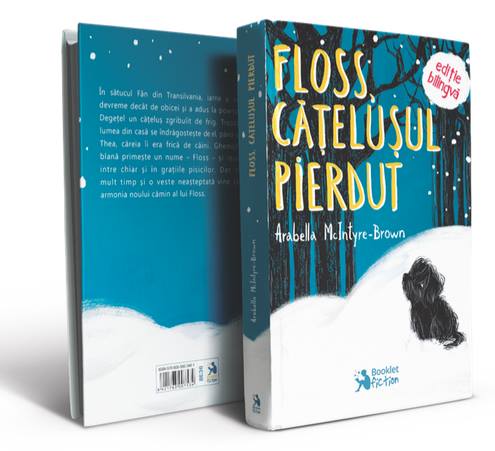 The English/Romanian bilingual edition “Floss the Lost Puppy” or “Floss, catelusul pierdut” is published by Booklet Fiction and illustrated by Andreea Chele. Arabella McIntyre-Brown is donating her royalties to two animal charities in Romania.
The English/Romanian bilingual edition “Floss the Lost Puppy” or “Floss, catelusul pierdut” is published by Booklet Fiction and illustrated by Andreea Chele. Arabella McIntyre-Brown is donating her royalties to two animal charities in Romania.
By Diana Mesesan, features writer diana@romania-insider.com
(photo by Diana Mesesan, illustrations by Andreea Chele)